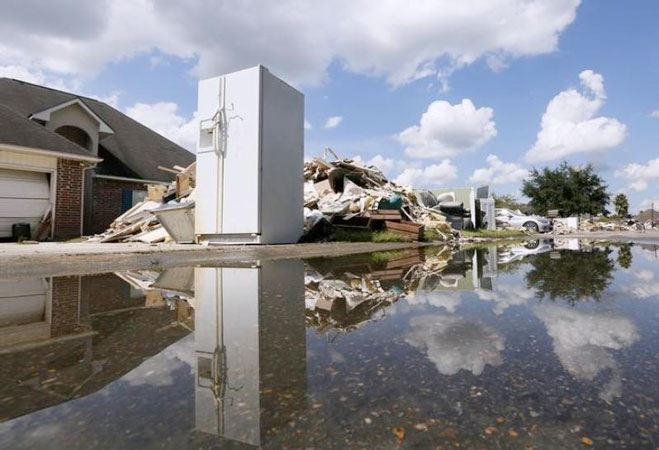
By Dennis Sadowski
This is the third in a series of articles about issues pertaining to the upcoming presidential election.
WASHINGTON (CNS) – August’s torrential rains that caused catastrophic flooding in southern Louisiana have convinced Robert Gorman that it’s time to think about being ready the next time the floods hit.
Gorman, executive director of Catholic Charities of the Diocese of Houma-Thibodaux, La., has been discussing with his wife pre-emptive steps to take before the water rises. While their home wasn’t damaged in August, the Gormans are getting prepared should an unpredictable downpour affect their neighborhood.
Catholic Charities is among numerous agencies still responding to the immediate needs of families displaced by the storm, which dropped up to 31 inches of rain in some locales.
Louisiana is increasingly becoming prone to flooding, meteorologists and climate scientists have said. Its location on the Gulf Coast exposes it to strong hurricanes such as Hurricane Katrina, which devastated New Orleans and surrounding areas in 2005. A conference hosted by the Houma-Thibodaux Diocese in 2009 heard from a scientist member of the Intergovernmental Panel on Climate Change who, Gorman recalled, described how climate change would subject the state to more intense periods of monsoon-like rains followed by times of drought.
Southern areas of the state are more vulnerable to high water because of subsidence, the gradual sinking of the land; erosion along the Gulf Coast, some of it brought on by development, and rising sea levels caused by the earth’s warming climate.
Up to 97 percent of climate scientists have attributed climate change to human activity at least in part.
The Catholic Charities executive in a Sept. 19 interview with Catholic News Service (CNS) called upon the presidential candidates and elected officials to take seriously the threat of flooding and disappearing land not just in Louisiana, but also in other coastal communities.
Louisiana is one of the nation’s poorest states. The Census Bureau reported Sept. 13 that 19.6 percent of Louisianans lived in poverty in 2015. Gorman said poor residents will be affected most by natural disasters because they are more likely to live in communities most vulnerable to flooding. Gorman said he is hearing from more families, many settled in communities since the 18th century, about relocating because of invading waters.
‘Something We Can’t Ignore’
“It’s something we can’t ignore,” he said. “The sea-level rise is obvious to everybody. I don’t think we’ve even started to do a good job connecting sea-level rise to climate change.”
Gorman expressed concern with missing dialogue on climate change in the presidential campaign. “I don’t hear it being discussed at all,” he said.
He’s not alone.
Catholic observers told CNS that they are troubled by the almost invisible profile of climate change while the divisive campaign instead focuses on personality, integrity and personal competency despite voter support for addressing environmental concerns.
“Politically, we’re saying we want leadership who want to enhance our role as faithful people to be good stewards of the environment,” said Franciscan Sister Ilia Delio, the Josephine C. Connelly chair in Christian theology at Villanova University.
She called the concern for the environment as much as a right-to-life issue as abortion.
“We are for life and when we are destroying life in any way, we are working against the very thing we believe in and that is the incarnation,” Sister Ilia said.
More so, she added, Pope Francis in his 2015 encyclical, “Laudato Si’, on Care for Our Common Home,” encourages people of faith to lead the way in addressing environmental concerns and building community across cultures where politicians do not.
Mercy Sister Karen Donahue, justice coordinator of her order’s West Midwest Community in Detroit, told CNS that people of faith are responsible for acting on behalf of the environment and acting on the pope’s call.
She described care for creation as a pro-life concern and urged clergy to bring the church’s teaching on the environment to the pulpit as much as they do abortion and euthanasia.
“I think the danger is people say these are political issues,” Sister Karen explained. “Yes, they may be political, but they’re profound to our faith.”
